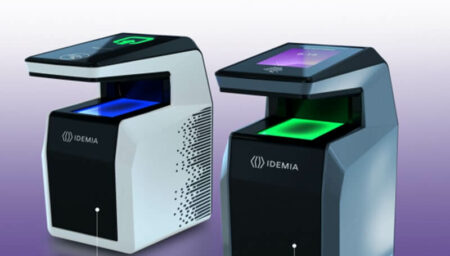Delivering frictionless access everywhere with the MorphoWave range

IDEMIA, the world leader in Augmented Identity launched an independent international survey of 2,800 respondents to see what people around the world think of biometrics. More than 200 to 400 interviews were conducted in each of the 11 countries, representative of the overall population. Here are some of the most interesting findings.
Around the world, people are overwhelmingly positive about biometric authentication technologies, with 74% of respondents having a positive or very positive attitude towards it. What’s drawing them in? Having a single unique login, preventing fraud and the overall ease of use top of the list.
A whopping 90% of people around the world say they’re ready to use biometric identification processes. The majority, 61%, would use it to unlock their phones while others envisioned paying in store and online.
Surprisingly the technical aspect of biometrics and the often-associated lack of human contact raised very few red flags among survey participants. Meanwhile, respondents were fearful of identity theft, data fraud and privacy concerns.
Most those surveyed (78%) have already dabbled in biometric authentication, namely fingerprint verification (63%). In our tech-infused world, only 22% of respondents have never tried it before.
Fingerprint is not only seen as the most secure and most accurate form of biometrics but the most convenient as well. Regarding accuracy and security, iris recognition was a close second, while facial recognition was runner-up in convenience.
Brazilians have a very positive opinion about biometric technologies. In fact, 89% have tried it, primarily because fingerprint registration is required to vote in the national election. The U.A.E. comes in second for its positive perception of biometric authentication (81%), appreciated particularly for its innovative and fun aspect. They are the least wary of fraud or data or identity theft.
While the majority (61%) of French respondents has a positive attitude towards biometric technologies, they are below the global average of 74%. Perhaps as a result, the country also had the fewest respondents who had given the mobile wallet a try.
In banking, 82% of respondents want to replace PIN codes with their fingerprint although 87% would still like to keep it as a backup option.
Respondents are divided on how to register their fingerprints on a payment card, but most of them would prefer to enroll it by themselves via their banking app (42%) or with the help of a bank agent in a branch (67%). A vast majority would prefer to keep it in the chip of their card (40%) instead of having it stored in the cloud (11%).
43% of respondents are already using their biometric data to pay with mobile phones. However, there is a huge regional divide with India leading with 86% versus only 11% in France.
IDEMIA is a true biometrics pioneer, with F.CODE – a payment card that turns your fingerprint into your PIN – and with groundbreaking programs, including the ambitious Aadhaar program in India – which attributes a unique ID number to every one of country’s 1.3 billion citizens – and Terminal 4 at Singapore’s Changi Airport – where passengers get from the curbside to the boarding gate in under 10 minutes using just their biometric data.